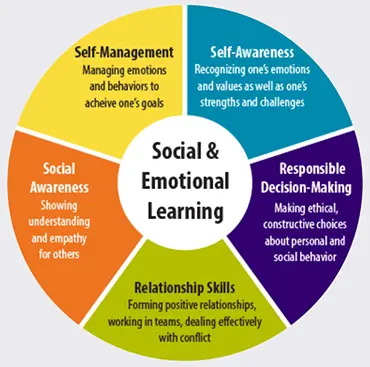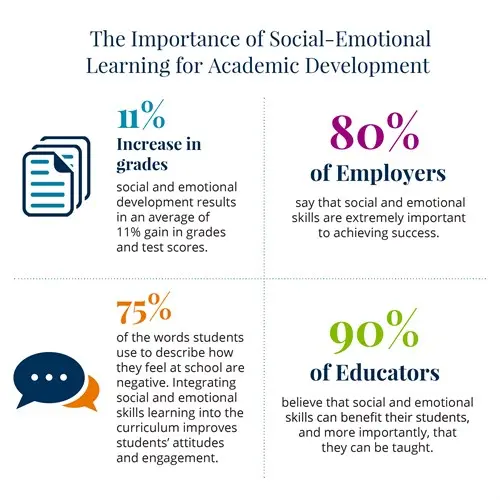
Moonpreneur
Children are vulnerable, especially when they step out of the secure environment of their homes and face the emotional and social stresses of the world. In such situations, children require guidance to confront their emotions and tackle them, and this is where Social Emotional Learning (SEL) plays a critical role.

In the United States, tremendous growth has been witnessed in the number of states prioritizing SEL. According to CASEL, 27 states have implemented K-12 SEL competencies, and all 50 have implemented pre-kindergarten SEL competencies.
SEL has gained rapid recognition because it addresses the fundamental challenges that can escalate into more significant issues if left unaddressed. It provides emotional stability that helps children maintain healthy relationships with their classmates and teachers, reduces bullying and dropout rates, and of course, improves their academic performance.
History of Social-Emotional Learning
SEL is a new concept that came into being when a group of people came together in 1994 to identify key skills and competencies students need to successfully navigate school and life.
Daniel Goleman, the author of Social Intelligence and Emotional Intelligence, and educator-philanthropist Eileen Rockefeller Growald, the Collaborative for Academic, Social, and Emotional Learning (CASEL), are the pioneers of SEL.
The credit goes to them for developing this brilliant concept to end a piecemeal approach to social and emotional issues that students face and create a common understanding and goal for student development.
What is Social Emotional Learning?
Maurice Elias, a psychology professor at Rutgers University and director of the university’s Social-Emotional Learning Lab, describes SEL as the process through which we learn to recognize and manage emotions, care about others, make good decisions, behave ethically and responsibly, develop positive relationships, and avoid negative behaviors.
It trains children to understand and manage their emotions, how form positive relationships with others, and make responsible decisions.
Why has SEL been implemented in schools?
SEL assists children and adults in making their schools and communities stronger, safer, and more equitable. It teaches them to better understand their emotions and empathize with others.

The key components of Social Emotional Learning
- Self-awareness: The ability to recognize and understand one’s emotions, strengths, and weaknesses.
- Self-management: The ability to regulate one’s emotions, thoughts, and behaviors in different situations.
- Social awareness: The ability to empathize with and understand the perspectives of others and to appreciate diversity.
- Relationship skills: The ability to establish and maintain positive relationships with others, including effective communication, teamwork, and conflict resolution.
- Responsible decision-making: The ability to make ethical and constructive choices about personal behavior and social interactions.
How Educators Approach Social-Emotional Learning
Educators approach SEL in the following ways.
- Incorporating SEL into the curriculum: Educators can integrate SEL into existing subject areas or develop standalone lessons or units focused on specific social and emotional skills.
- Creating a positive classroom environment: Educators can create a safe and supportive learning environment that promotes positive interactions, respectful communication, and collaboration among students.
- Fostering relationships: Educators can prioritize building positive relationships with students and creating opportunities for peer relationships, such as cooperative learning activities.
- Modeling social and emotional skills: Educators can model social and emotional competencies themselves, such as regulating their own emotions and demonstrating empathy and respect for others.
- Providing opportunities for practice and feedback: Educators can provide structured opportunities for students to practice and apply social and emotional skills and provide feedback and support for their growth.
- Involving families and communities: Educators can involve families and communities in supporting students’ social and emotional development through parent education, community partnerships, and other collaborative efforts.
Ultimately, the approach to SEL will vary depending on the needs and context of each classroom and school. However, a comprehensive approach to SEL can help students develop the social and emotional competencies they need to succeed academically and socially and to navigate the challenges and opportunities they will face in their lives.
Moonpreneur is dedicated to transforming conventional education, preparing the next generation with comprehensive learning experiences. Our Innovator Program equips students with vital skills in AI/ML, Robotics, Coding, Game Development, and App Development, fostering entrepreneurship through hands-on learning. This initiative aims to cultivate the workforce of tomorrow by integrating innovative technologies and practical skills in school curriculums.
Register for a 60-minute free workshop today!



























Why is SEL important?
Strong SEL skills benefit individuals in various ways:
Academic Success: Improved focus, motivation, and collaboration skills lead to better learning outcomes.Emotional Well-being: Managing emotions effectively reduces stress, anxiety, and depression.Positive Relationships: Strong social skills foster healthy interactions and build supportive networks.Responsible Choices: Understanding consequences leads to more responsible decision-making.